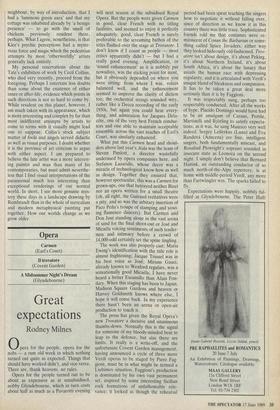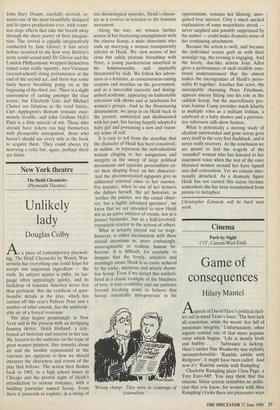Opera
Carmen (Earl's Court) II trovatore (Covent Garden)
Great expectations
Rodney MIInes
0 pera for the people, opera for the nobs — a rum old week in which nothing turned out quite as expected. Things that should have worked didn't, and vice versa. There are, thank heavens, no rules.
Opera for the people turned out to be about as expensive as at unsubsidised, nobby Glyndebourne, which in turn costs about half as much as a Pavarotti evening will next season at the subsidised Royal Opera. But the people were given Carmen in good, clear French with no titling facilities, and seemed to enjoy it perfectly adequately; good, clear French is surely preferable to the screaming bathos of the titles flashed over the stage at Trovatore. I don't know if I count as people — most critics apparently didn't — but I had a really good evening. Amplification, or `sound enhancement' as it is nobbily put nowadays, was the sticking point for most, but it obviously depended on where you were sitting: from where I was, voices balanced well, and the enhancement seemed to improve the clarity of diction too; the orchestral strings sounded wiry, rather like a Decca recording of the early 1950s, but again you could hear every- thing, and admiration for Jacques Dela- cote, one of the very best French conduc- tors and one able to maintain acceptable ensemble across the vast reaches of Earl's Court, was similarly enhanced.
What put this Carmen head and shoul- ders above last year's Aida was the team of Steven Pimlott, a director wastefully underused by opera companies here, and Stefanos Lazaridis, whose decor was a miracle of technological know-how as well as design. Together they ensured that, however spectacular, this was a Carmen for grown-ups, one that betrayed neither Bizet nor an opera written for a small theatre (oh, all right, the Guiraud recitatives were a pity, and so was the arbitary insertion of Paco Petia's troupe of stamping and yowl- ing flamenco dancers). But Carmen and Don Jose standing alone in the vast arena of sand for the final shoot-out or Jose and Micaela voicing sentiments of such tender- ness and intimacy before a crowd of 14,000-odd certainly set the spine tingling. The work was also properly cast: Maria Ewing's identification with the title role is almost frightening; Jacque Trussel was in his best voice as Jose; Miriam Gauci, already known to Wexford regulars, was a sensationally good Micaela; I have never heard a better Escamillo than Alain Fon- dary. When this staging has been to Japan, Madison Square Gardens and heaven or Harvey Goldsmith knows where else, I hope it will come back. In my experience there hasn't been an arena or open-air production to touch it.
The press has given the Royal Opera's new Trovatore a decisive and unanimous thumbs-down. Normally this is the signal for someone of my bloody-minded bent to leap to the defence, but alas there are limits. It really is a write-off, and the unfortunate Covent Garden management, having announced a cycle of three more Verdi operas to be staged by Piero Fag- gioni, must be in what might be termed a Liubimov situation. Faggioni's production is dominated by his own vast permanent set, inspired by some interesting Sicilian rock formations of unfathomable rele- vance; it looked as though the rehearsal period had been spent teaching the singers how to negotiate it without falling over, since of direction as we know it in this country there was little trace. Sophisticated friends told me that costumes were re- miniscent of Conan the Barbarian or some- thing called Space Invaders, either way they looked hideously old-fashioned. Trov- atore isn't about design, it's about Peking, it's about Northern Ireland, it's about South Africa, it's about the lunacy that assails the human race with depressing regularity, and it is articulated with Verdi's unique blend of bleakness and compassion. It has to be taken a great deal more seriously than it is by Faggioni.
It was respectably sung, perhaps too respectably conducted. After all the weeks of hype, Placido Domingo would have had to be an amalgam of Caruso, Pertile, Martinelli and Bjorling to satisfy expecta- tions; as it was, he sang Manrico very well indeed. Sergey Leiferkus (Luna) and Eva Randova (Azucena) are fine, intelligent singers, both fundamentally miscast, and Rosalind Plowright's soprano sounded in insecure state as Leonora on the second night. I simply don't believe that Bernard Haitink, an outstanding conductor of so much north-of-the-Alps repertory, is at home with middle-period Verdi, any more than Furtwangler was. The sparks failed to fly.
Expectations were happily, nobbily ful- filled at Glyndebourne. The Peter Hall/ John Bury Dream, carefully revived, re- mains one of the most beautifully designed and lit opera productions ever, with count- less stage effects that take the breath away through the sheer poetry of their imagina- tion. The revival is equally imaginatively conducted by Jane Glover; it had never before occurred to me how sexy Britten's score could sound until Dr Glover and the London Philharmonic wrapped themselves round some really squirmy, neo-Viennese (second-school) string portamentos at the end of the second act, and there was some fairly heavy breathing going on at the beginning of the third, too. There is a slight unevenness of casting amongst the four lovers, but Elizabeth Gale and Michael Chance are fabulous as the royal fairies, Curt Applegren's Bottom remains enor- mously lovable, and John Graham Hall's Flute is a little miracle of wit. Those who already have tickets can hug themselves with pleasurable anticipation, those who haven't should use every wile in the book to acquire them. They could always try marrying a critic but, again, perhaps there are limits.



















































 Previous page
Previous page